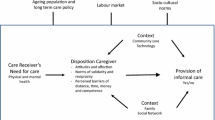Conclusions
As we gain a deeper understanding of the needs of different subgroups of caregivers, it is increasingly clear that a range of services must be developed to meet their heterogenous needs and those of their frail older relatives. There is by now a very large, truly international body of literature attesting to the negative effects which caregiving can have on the carer’s own emotional and physical health. (One ofAgeing International’s first reviews of this cross-national literature appeared in the fall of 1980.)
In part because the research evidence is unassailable, policy-makers are increasingly heard expressing encouragement to and support of these caregivers. In no country, however, is there a consensus about the types and level of support to be provided, or how it will be financed. Part II of this article will provide an update on some of the policy options being examined in industrialized nations, as well as recent research findings that bear on the central policy question of which needs of the dependent elderly can best be met by informal carers and which by the formal service sector.
Similar content being viewed by others
Select Bibliography
Brody, Elaine and Schoonover, Claire, “Patterns of Parent-Care When Adult Daughters Work and When They Do Not” Paper presented at the Annual Meeting of the Gerontological Society of America, New Orleans, November 1985. In press,The Gerontologist.
Cantor, Marjorie, “Strain Among Caregivers: A Study of Experience in the United States.”The Gerontohgist, Vol. 23, #6, December 1983.
Day, Alice,Who Cares? Demographic Trends Challenge Family Care for the Elderly. Population Trends and Public Policy, No. 9. Washington, D.C.: Population Reference Bureau, September 1985.
Fitting, Melinda, and Rabins, Peter, “Men and Women: Do They Care Differently?”,Generations, Vol. X, #1, Fall 1985.
Hirschfeld, Miriam J., and Krulik, Tamar, “Family Caregiving to Severely, Chronically Ill Children and the Aged.” In:Long-Term Care, edited by Kathleen King. New York: Churchill Livingston, 1985
Hörl, Josef, and Rosenmayr, Leopold, “Families versus Organizations as Caregivers.” Paper presented at the XIII International Congress of Gerontology, New York, N.Y., July 12–17, 1985.
Horowitz, Amy, “Sons and Daughters as Caregivers to Older Parents: Differences in Role Performance and Consequences.”The Gerontohgist, Vol. 25, #6, December 1985.
Kendig, Hal L., “Towards Integrated Community Care for the Disabled Aged: The Australian Case.” Paper presented at the XIII International Congress of Gerontology, New York, N.Y., July 12–17, 1985.
Simeone, I., Hugonot, R., and Vecchi, G.P., “Coping Mechanisms of Families With a Relative Suffering from Dementia.” Paper presented at the XIII International Congress of Gerontology, New York, N.Y., July 12–17, 1985.
Sundstrom, Gerdt, “Family and State: Recent Trends in the Care of the Aged in Sweden.” Paper presented at the XIII International Congress of Gerontology, New York, N.Y., July 12–17, 1985.
The Travelers Corporation, “The Travelers Employee Caregiver Survey: A Survey of Caregiving Responsibilities of Travelers’ Employees for Older Americans,” July 1985.
Walker, Alan, “Care of Elderly People.” Paper presented at the Leeds Castle Seminar, Social Policy: Aims and Resources for the 1990’s, September 1984.
Rights and permissions
About this article
Cite this article
Gibson, M.J., Nusberg, C. Caregiving in developed nations: Part I. Ageing International 13, 17–19 (1986). https://doi.org/10.1007/BF02999035
Issue Date:
DOI: https://doi.org/10.1007/BF02999035




